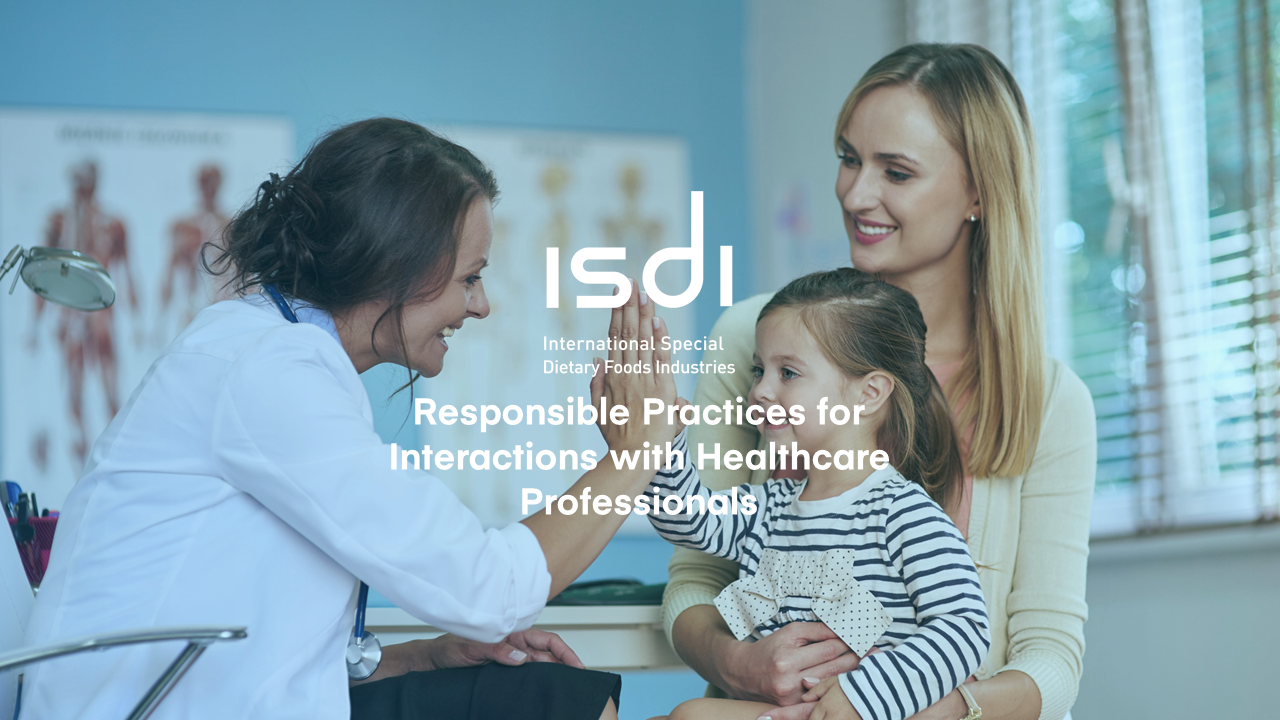Responsible Practices for Interactions with Healthcare Professionals
Healthcare professionals (HCPs) ensure that caregivers, parents and people with special dietary needs have access to science-based information in order to make informed nutrition choices for themselves and their families.
Our industry’s interactions with HCPs must be consistent with, and supportive of, the medical responsibility of HCPs in providing nutrition recommendations to caregivers, parents and people with special dietary needs that are evidence-based and meet rigorous scientific standards.
Interactions with HCPs must be responsible, transparent, ethical and in full compliance with local laws and regulations. They should be free of any direct or indirect appearances of impropriety, including gift-giving or other benefits that convey more than a nominal value.
Our industry will work constructively with all relevant stakeholders, including policy-makers and HCPs, to promote evidence-based policies and ethical frameworks that enable caregivers, parents and people with special dietary needs to receive the best possible nutrition education and advice to help them make informed nutrition choices. ISDI holds its members to the highest ethical standards and we take pride in our members operating, communicating and acting in an ethical and appropriate manner.
Bringing better nutritional solutions
Today, malnutrition in babies and children under five years of age is still widespread, leading to undernutrition, micronutrient deficiencies and obesity[1]. The long-term consequences of childhood malnutrition are far-reaching and often irreversible.
Moreover, malnutrition remains a largely unrecognised problem in hospitals and highlights the need for education on clinical nutrition[2]. Robust evidence exists that malnourished patients experience complications between 2 and 20 times more frequently than well-nourished patients[3].
It is of the utmost importance that HCPs regularly update their knowledge on nutritional science and research, and the same applies to industry experts. Therefore, multistakeholder collaborations involving HCPs, universities, research institutes and industry experts are crucial for developing products with the best science and innovation. Industries and medical communities mutually benefit from this knowledge-sharing and cooperation, which, when implemented with integrity and transparency, ultimately benefits babies and people with special dietary needs, especially those who are at risk of disease-related malnutrition and who would benefit from medically-recommended nutrition interventions.
Our industry is committed to working constructively with all relevant stakeholders and engaging in locally acceptable, effective, ethical and sustainable initiatives to address nutrition and development challenges and to help mitigate the adverse consequences of sub-optimal nutrition affecting young children and people with special dietary needs.
HCP interactions are important for paediatric nutrition
HCPs play a crucial role in the medical care and nutritional needs of patients young and old. Their expert advice enables patients to live healthy lives and their interventions save lives in times of great need. HCPs play an essential role in ensuring optimal growth and recovery, cognitive development and medical care to support the routine and urgent needs of their patients.
The ability of HCPs to consult with experts in numerous fields, including specialised nutrition, contributes to the incredible nutritional and medical advances in healthcare that have been made possible in recent years. Science-based, ethical, transparent and timely interactions with specialised nutrition experts, including companies that manufacture infant nutrition, is important for the ability of HCPs to provide expert care. For example, infants born prematurely or with other medical complications are surviving previously life threatening circumstances. Urgent interventions, including advances in paediatric nutrition, make survival possible for the most vulnerable babies.
Equally, the ability for specialised nutrition expert companies to interact with HCPs in an ethical and transparent way ensures that innovations and products are relevant and adapted to the targeted carers and patients.
Download the document here.
[1] See more: https://www.who.int/publications/i/item/jme-2020-edition
[2] McWhirter JP, Pennington CR. Incidence and recognition of malnutrition in hospital. Br. Med. J. 1994.
[3] Evidence has been shown since the 1980s: Buzby et al. Am J Surg,1980, Hickman et al. JPEN,1980, Klidjian et al. JPEN,1982, Reilly J et al. JPEN, 1988 or Detsky et al. JAMA, 1994. Cerholm et al. Clinical Nutrition, 2015

